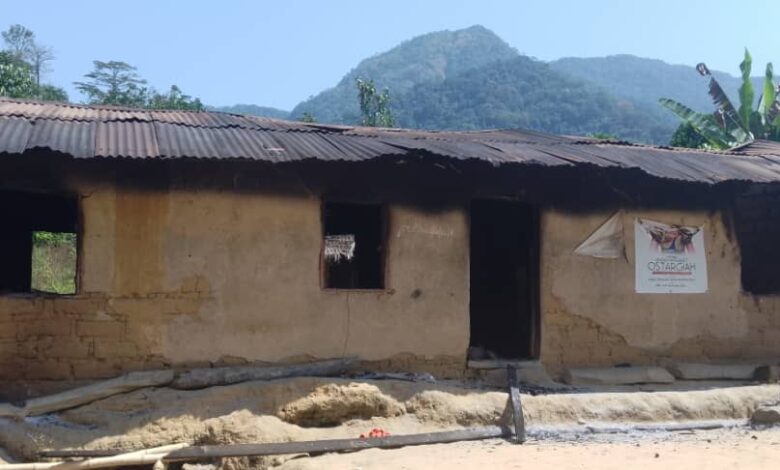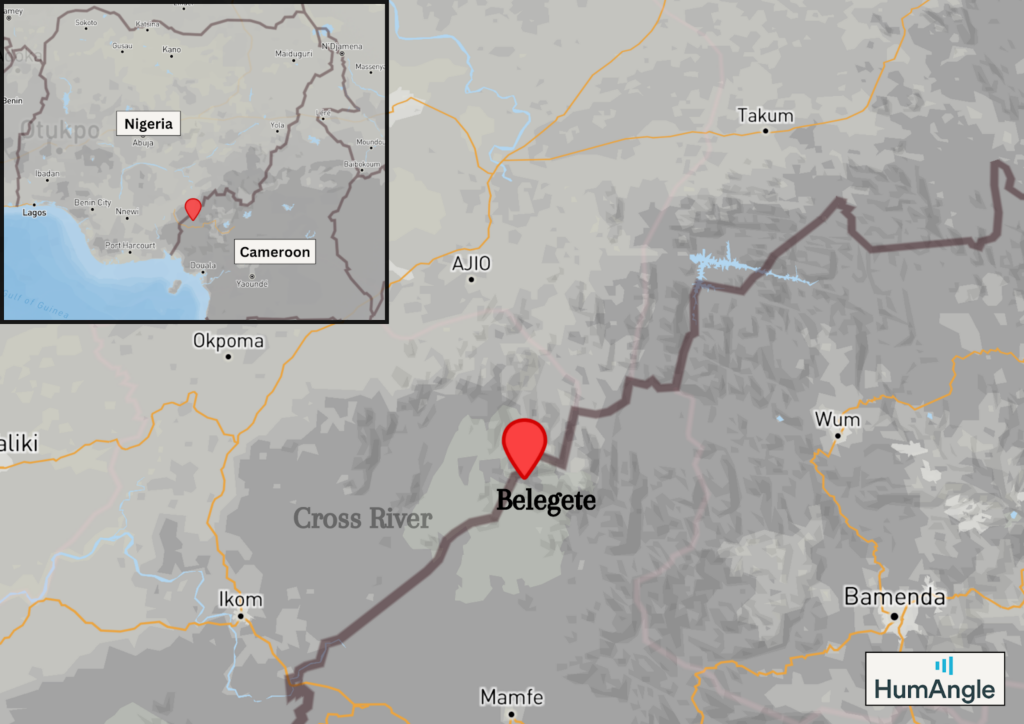Survivors Of Ambazonia Militant Attack In Nigeria Are Experiencing The Festive Season Differently
It's been almost three weeks since rebel fighters from Cameroon invaded Belegete, a community in the Obanlikwu area of Nigeria’s Cross River. But displaced residents cannot return to their homes even as Christmas and New Year celebrations draw close.

Achue Sunday has spent the last 20 years of his life in Belegete, Obanlikwu local government area of Cross River, South-South Nigeria, and one moment he cherishes the most yearly is the festive season, the period from mid-December to early January.
Aside from the Christmas and New Year celebrations that reunite loved ones, the holiday season is also used to discuss the growth and development of their community. According to him, sons and daughters of Belegete usually return from different parts of the country and abroad to make their commitment to the community.
“We start the preparation of our festive season in early November because of our brothers and sisters coming home to celebrate with us. We try to put things in place early enough so that we can host our annual village meeting. The focus of the annual meeting is usually to discuss the development of the village and our agenda for the following year,” Sunday told HumAngle.
Issues discussed at this meeting range from the renovation of primary and secondary schools in the community to the state of the primary healthcare centres and the situation at the churches. They also contribute to support each other, especially the youth who need money for business and academic pursuits.
“This year’s meeting had been scheduled for Dec. 27, but it will no longer be held because our community is under attack,” Sunday said.
It’s been almost three weeks since separatist rebels of the Ambazonia Defence Forces (ADF) in the southwest and northwest regions of Cameroon invaded Belegete, a border community hosting refugees in Nigeria’s Cross River.
The refugees ran into Nigeria through a porous border and without identification following the repeated clashes between ADF separatists and Cameroonian forces. The violence has reportedly led to over 6,000 deaths and the displacement of almost 600,000 people.
On Dec. 5, the rebels, who also have access to border communities, kidnapped Chief Francis Ogweshi, a traditional leader in Belegete and 20 others after holding the village hostage for 24 hours without the intervention of the Nigerian security agency.
The kidnappers wanted Ogweshi to produce Cameroonians seeking refuge in Belegete, including rebels who had deserted, but he objected, saying he didn’t know their whereabouts. The traditional leader was killed two days later after soldiers who had gone to the forest to search for the kidnapped victims killed one of the rebels during a gunshots exchange.

In a midnight raid on Friday, Dec. 8, the Ambazonia rebels again attacked Belegete. They opened fire on armless residents, leading to the death of a farmer identified as Achue Moses. They injured many people, burnt several houses and forced the displacement of over a thousand people, including children.
Nearly three weeks after the deadly attack, many displaced persons are still sleeping in the cold at the Obudu ranch area. Some women and children remain missing, making Christmas and New Year celebrations difficult for residents.
‘We can’t go home’
Though Sunday’s elder brother had already promised to be home from Lagos, embarking on such a journey at this time comes with huge risks. He briefed him about how Muwah Augustine was injured by the Ambazonia fighters when he came to Belegete to visit his parents. Augustine’s parents are, in fact, still missing.
“My brother cannot stand the risk of being kidnapped by the rebels. Like him, many families’ relatives can’t come to the village and we won’t be able to hold our annual meeting. The attack has really affected us,” Sunday said.
While children have been asking for Christmas clothes, the displaced parents are more concerned about food shortages and how long they will continue to live in the cold.
“The last Christmas was very okay because there was no problem. The table has turned. The rebels killed all the livestock we intended to kill for our children to celebrate. I planned to celebrate my daughter’s birthday with Christmas, but I can’t now. She’s been disturbing me saying, ‘Daddy, when is my birthday?’”

The absence of food has forced many of the displaced people to feed on leaves.
Ndah Ferdinand, Belegete community chairman and one of the public school teachers, tells HumAngle this has been the most difficult period in his life.
“I’ve been out of my house for almost three weeks now, and there is no help from anybody. No single non-governmental organisation has paid us a visit except personnel of the State Emergency Management Authority (SEMA) who came to get some information from us on Dec. 18.”
Ferdinand added that while Juliet Afah, a 20-year-old mother of one who had a child on Dec. 11, is yet to see her missing husband, two other displaced women gave birth last week. Like Afah, they also do not know the whereabouts of their husband since the attack.
“The newborn children and their mothers are really suffering. No clothes, no good food, and no home to lay their heads. We are living in sadness and perpetual fear.”
‘Red flag’
Since the separatists left a message that they were coming back to the community within the next few weeks, Belegete residents are living under threat even as many continue to search for their missing loved ones.
“Some soldiers and police officers came to the ranch to assure us that the government is working on restoring normalcy, but we should not return yet to the community because of the possible return of the Ambazonia rebels. We don’t know how long we will stay on the ranch as displaced persons,” Ferdinand told HumAngle.
We contacted Cross River police spokesperson Irene Ugbo for an update on the security situation, but she has yet to respond.
Meanwhile, Peter Akpanke, who represents Obanliku, Bekwarra, and Obudu Federal Constituency at the National Assembly, is said to have donated a few bags of cassava flakes and rice to the displaced persons on Dec. 22. Other items donated include detergents, salt, and seasonings.
“The foodstuff is almost exhausted, but they came at the right time,” said Ferdinand.
Support Our Journalism
There are millions of ordinary people affected by conflict in Africa whose stories are missing in the mainstream media. HumAngle is determined to tell those challenging and under-reported stories, hoping that the people impacted by these conflicts will find the safety and security they deserve.
To ensure that we continue to provide public service coverage, we have a small favour to ask you. We want you to be part of our journalistic endeavour by contributing a token to us.
Your donation will further promote a robust, free, and independent media.
Donate HereStay Closer To The Stories That Matter




